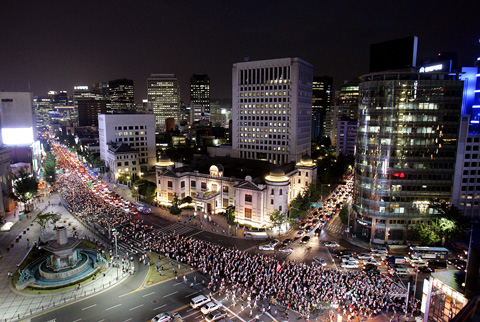A militant South Korean union grouping said more than 130,000 members would stage work stoppages from yesterday against US beef imports, as religious leaders joined weeks of street protests.
South Korean President Lee Myung-bak is struggling to end the rallies, which were sparked by fears of mad cow disease but are now increasingly driven by liberal opponents of his new conservative government.
“We will stage an uncompromising struggle against the government, which ignores the people’s right to health,” the Korean Confederation of Trade Unions (KCTU) said in a statement.

PHOTO: AP
A KCTU spokesman said yesterday’s partial strike would draw some 136,000 workers including those at the country’s largest automaker Hyundai Motor and 29,000 workers at its affiliate Kia Motors.
There was no immediate confirmation of the numbers who would take part.
A Hyundai Motor spokesman said some 44,000 workers would down tools for two hours during both the day and night shifts at its main factory in the southeastern city of Ulsan.
The KCTU said thousands of others who do not take part in yesterday’s stoppages would stage a four-hour partial strike on today.
It said tens of thousands of members plan to travel to Seoul late tomorrow to join candlelight protests against the beef imports on Saturday.
“Yes, this is a political strike. This strike is clearly aimed at protesting against the resumption of beef imports,” KCTU spokesman Park Soung-shik said.
“The government calls it illegal but we don’t think so. Workers are part of the people and we have every right to protect our health,” Park said.
The government is pushing ahead with the distribution of US beef, saying extra negotiations with Washington this month fully addressed public fears over mad cow perils.
The first delivery of 200kg of US beef sold out five hours after it hit the market on Tuesday, said Park Chang-gyu, who heads an association of beef importers. It costs one-third the price of domestic beef.
“Many consumers are asking for US beef,” a shopkeeper at Shihung district in southwest Seoul told JoongAng Ilbo newspaper.
The office of South Korean Prime Minister Han Seung-soo bought 12kg. “The prime minister himself will consume this beef to help dispel public concerns,” a spokesman said.
Seoul agreed in April to resume the US beef imports — which were halted in 2003 after a US mad cow case — so it can push ahead with a wider trade deal.
After mass rallies, it negotiated extra beef safeguards and called for the protests to stop, saying they are damaging the economy.
But the rallies, some of them violent, continued.
More than 200 people were injured overnight Saturday and police vowed a crackdown on illegal demonstrations.
In a new twist, Catholic priests, Buddhist monks and Protestant pastors this week joined the candlelit protests.
Hong Joon-pyo, parliamentary leader of the ruling Grand National Party (GNP), said they are complicating the situation.
“The flames of the candlelit protests, which had been fluttering out, are being rekindled by some liberal religious leaders,” Hong said at a meeting of GNP leaders.
“If the government, following 10 years of liberal rule, failed to anticipate this degree of resistance from progressive forces, it would deserve a label of naivete,” he said.

In the sweltering streets of Jakarta, buskers carry towering, hollow puppets and pass around a bucket for donations. Now, they fear becoming outlaws. City authorities said they would crack down on use of the sacred ondel-ondel puppets, which can stand as tall as a truck, and they are drafting legislation to remove what they view as a street nuisance. Performances featuring the puppets — originally used by Jakarta’s Betawi people to ward off evil spirits — would be allowed only at set events. The ban could leave many ondel-ondel buskers in Jakarta jobless. “I am confused and anxious. I fear getting raided or even

Kemal Ozdemir looked up at the bare peaks of Mount Cilo in Turkey’s Kurdish majority southeast. “There were glaciers 10 years ago,” he recalled under a cloudless sky. A mountain guide for 15 years, Ozdemir then turned toward the torrent carrying dozens of blocks of ice below a slope covered with grass and rocks — a sign of glacier loss being exacerbated by global warming. “You can see that there are quite a few pieces of glacier in the water right now ... the reason why the waterfalls flow lushly actually shows us how fast the ice is melting,” he said.

RISING RACISM: A Japanese group called on China to assure safety in the country, while the Chinese embassy in Tokyo urged action against a ‘surge in xenophobia’ A Japanese woman living in China was attacked and injured by a man in a subway station in Suzhou, China, Japanese media said, hours after two Chinese men were seriously injured in violence in Tokyo. The attacks on Thursday raised concern about xenophobic sentiment in China and Japan that have been blamed for assaults in both countries. It was the third attack involving Japanese living in China since last year. In the two previous cases in China, Chinese authorities have insisted they were isolated incidents. Japanese broadcaster NHK did not identify the woman injured in Suzhou by name, but, citing the Japanese

RESTRUCTURE: Myanmar’s military has ended emergency rule and announced plans for elections in December, but critics said the move aims to entrench junta control Myanmar’s military government announced on Thursday that it was ending the state of emergency declared after it seized power in 2021 and would restructure administrative bodies to prepare for the new election at the end of the year. However, the polls planned for an unspecified date in December face serious obstacles, including a civil war raging over most of the country and pledges by opponents of the military rule to derail the election because they believe it can be neither free nor fair. Under the restructuring, Myanmar’s junta chief Min Aung Hlaing is giving up two posts, but would stay at the